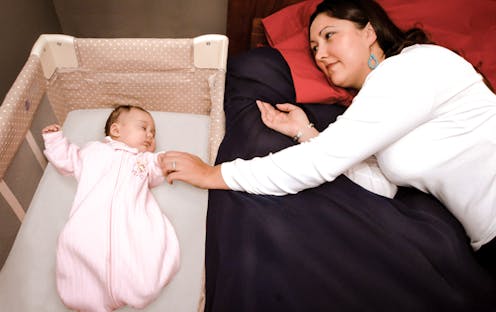The tragedy of sudden unexpected infant deaths – and how bedsharing, maternal smoking and stomach sleeping all contribute
- Written by Fern R. Hauck, Professor of Family Medicine and Public Health Sciences, University of Virginia

Unsafe sleep practices underlie most sudden unexpected infant deaths in the U.S., with three-quarters of infants affected by multiple unsafe practices at the time of death, and almost 60% sharing a sleep surface with another person. These are the key findings from our recent study published in Pediatrics[1].
Sudden unexpected infant death, or SUID, occurs in infants less than 1 year old who die suddenly and unexpectedly without an obvious cause before investigation, accounting for about 3,400 deaths annually in the U.S.[2]. These infants die from sudden infant death syndrome, or SIDS, accidental suffocation and strangulation in bed, or other ill-defined and unknown causes.
Infants sharing a sleep surface with parents, other adults or other infants or children is highly discouraged by the American Academy of Pediatrics and numerous other agencies because it can increase the risk of these deaths[3].
So the high occurrence of surface sharing – also called bedsharing – in our study is alarming. The study included 7,595 infants who died from SUID during the period 2011 to 2020 and who were in the Centers for Disease Control and Prevention’s SUID Case Registry, which collects data from child death review teams[4] in 23 states, cities or counties.
We examined characteristics of infants who were bedsharing at the time of death.
Compared with nonsharing infants in our study, bedsharing infants were more likely to have the following characteristics:
- 0 to 3 months old, non-Hispanic Black and insured by Medicaid or other public plan
- Were found lying on their back in an adult bed, chair or couch
- Were affected by a higher number of unsafe sleep factors
- Had been exposed to maternal cigarette smoking while in the womb
- Were being supervised by someone impaired by drugs or alcohol at the time of death
- Did not have a crib in the home
Among nonsharing infants in the study, only one-third were sleeping in the recommended back position, and three-quarters were in sleep areas that had soft bedding such as pillows, comforters or bumper pads at the time of death.
Three-quarters of all the sudden unexpected infant deaths in our study were affected by multiple unsafe sleep factors.
What you need to know about safe infant sleep and ways to reduce the risk of SUID.Why it matters
Rates of sudden unexpected infant deaths overall in the U.S. have changed only minimally in the past 20 years[5], but racial-ethnic disparities [in these deaths are widening] due to increasing rates among non-Hispanic Black infants.
Our study suggests that the majority of these deaths are preventable by following the guidelines for safe infant sleep[6] as outlined by the American Academy of Pediatrics and the National Institute of Child Health and Human Development[7].
These guidelines include:
- Placing the baby to sleep on a firm, flat sleep surface
- Placing the baby to sleep in his or her parents’ room for the first six months on a separate sleep surface designed for infant sleep, close to the parents’ bed
- Keeping the baby’s sleep space free of soft objects, such as pillows and loose bedding
- Avoiding alcohol, marijuana, opioids and illicit drug use during pregnancy and after birth
- Avoiding smoke and nicotine exposure during pregnancy and after birth
So why are the sudden unexpected infant death rates not changing? Even with knowledge of the recommended practices, many parents find it difficult to follow the recommendations. Others may choose not to follow them or may not follow them all of the time.
For example, an exhausted mother might bring her baby into bed to feed him, and then fall asleep with the baby in the bed. Or a parent might place their baby on a pillow because they think the baby will be more comfortable and sleep better. Bedsharing may also be a common cultural or preferred practice, so not doing so might go against one’s beliefs or preferences.
It is essential for health care providers to take these factors into account when advising families. To ensure a safe sleep space, many cities have programs that provide a free crib[8] to parents unable to afford one.
What’s next
Much more research is needed to find the most effective ways to teach families about safe infant sleep. There are currently a number of studies underway using innovative methods to engage and educate parents, starting in pregnancy and continuing after the baby is born[9].
Focusing on families with the highest risk, like those in our study, is crucial to help eliminate sudden unexpected infant deaths and the racial-ethnic disparities that have, to date, been stubbornly resistant to change.
The Research Brief[10] is a short take on interesting academic work.
References
- ^ recent study published in Pediatrics (doi.org)
- ^ about 3,400 deaths annually in the U.S. (www.cdc.gov)
- ^ increase the risk of these deaths (doi.org)
- ^ collects data from child death review teams (doi.org)
- ^ minimally in the past 20 years (www.cdc.gov)
- ^ guidelines for safe infant sleep (doi.org)
- ^ National Institute of Child Health and Human Development (safetosleep.nichd.nih.gov)
- ^ provide a free crib (cribsforkids.org)
- ^ continuing after the baby is born (doi.org)
- ^ Research Brief (theconversation.com)
Authors: Fern R. Hauck, Professor of Family Medicine and Public Health Sciences, University of Virginia

